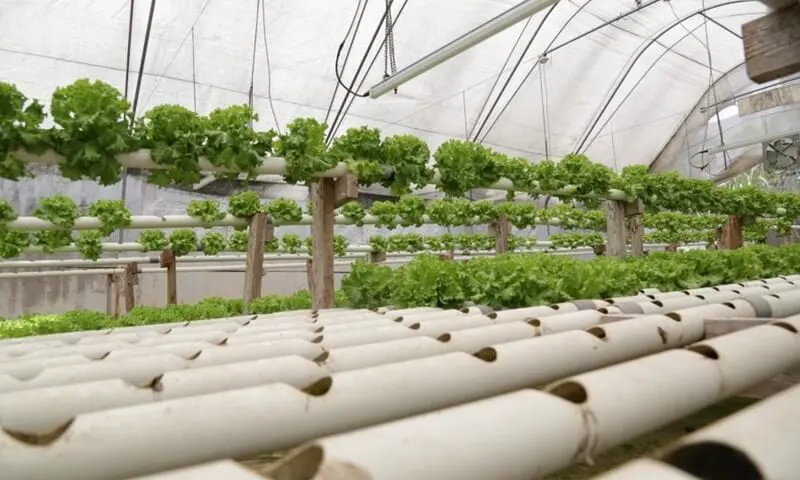‘Science-based farming optimized for reduced environmental impact’: What’s behind the hydroponic farming boom
‘Science-based farming optimized for reduced environmental impact’: What’s behind the hydroponic farming boom — and attempts to deny its sustainability advantages?


Hydroponic farming allows for vertical farming, because it is not dependent on the soil. This allows for greater plant yield per unit of land, which is becoming farming’s most precious resource.
…
Water use is also much lower, because hydroponic farms can recycle 98% of the water they use. Conservative estimates are that hydroponics uses <10% of the water as conventional farming.
With all of the environmental advantages you might think that organic growers would be enthusiastic – dramatically reduced water use, no pesticides, no pathogens, no nitrogen run-off. But organic farmers are not happy and they are pushing back.
Why? It appears to be naked brand protection. First they are trying to deny hydroponics the “organic” label, even though it can meet all of their requirements.
They argue this is because organic farming is all about nurturing the soil, and without soil how can you have organic farming. They pretend there is something magical and unknown about how soil feeds crops, and hydroponics cannot capture the magic – despite the fact that the produce is as good or better.
But we knew this about organic farming. They use more land than conventional farming for the same output, with significant negative environmental effects, but they don’t care.
This is an excerpt. Read the original post here.

 | Videos | More... |

Video: Nuclear energy will destroy us? Global warming is an existential threat? Chemicals are massacring bees? Donate to the Green Industrial Complex!
 | Bees & Pollinators | More... |

GLP podcast: Science journalism is a mess. Here’s how to fix it

Mosquito massacre: Can we safely tackle malaria with a CRISPR gene drive?

Are we facing an ‘Insect Apocalypse’ caused by ‘intensive, industrial’ farming and agricultural chemicals? The media say yes; Science says ‘no’
 | Infographics | More... |

Infographic: Global regulatory and health research agencies on whether glyphosate causes cancer
 | GMO FAQs | More... |

Why is there controversy over GMO foods but not GMO drugs?

How are GMOs labeled around the world?

How does genetic engineering differ from conventional breeding?
 | GLP Profiles | More... |

Alex Jones: Right-wing conspiracy theorist stokes fear of GMOs, pesticides to sell ‘health supplements’




 Viewpoint — Fact checking MAHA mythmakers: How wellness influencers and RFK, Jr. undermine American science and health
Viewpoint — Fact checking MAHA mythmakers: How wellness influencers and RFK, Jr. undermine American science and health Viewpoint: Video — Big Solar is gobbling up productive agricultural land and hurting farmers yet providing little energy or sustainabilty gains
Viewpoint: Video — Big Solar is gobbling up productive agricultural land and hurting farmers yet providing little energy or sustainabilty gains Trust issues: What happens when therapists use ChatGPT?
Trust issues: What happens when therapists use ChatGPT? Fighting deforestation with CO2: Biotechnology breakthrough creates sustainable palm oil alternative for cosmetics
Fighting deforestation with CO2: Biotechnology breakthrough creates sustainable palm oil alternative for cosmetics California, Washington, Oregon forge immunization alliance to safeguard vaccine access against federal undermining
California, Washington, Oregon forge immunization alliance to safeguard vaccine access against federal undermining 30-year-old tomato line shows genetic resistance to devastating virus
30-year-old tomato line shows genetic resistance to devastating virus The free-range chicken dilemma: Better for birds, but with substantial costs
The free-range chicken dilemma: Better for birds, but with substantial costs ‘You have to treat the brain first’: Rethinking chronic pain with Sanjay Gupta
‘You have to treat the brain first’: Rethinking chronic pain with Sanjay Gupta
